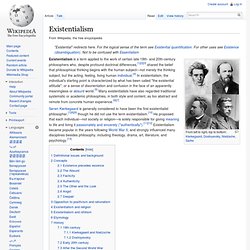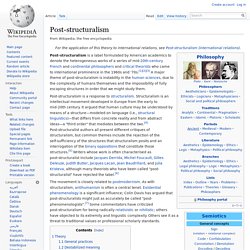

Existentialism. Existentialism is a term applied to the work of certain late 19th- and 20th-century philosophers who, despite profound doctrinal differences,[1][2][3] shared the belief that philosophical thinking begins with the human subject—not merely the thinking subject, but the acting, feeling, living human individual.[4] In existentialism, the individual's starting point is characterized by what has been called "the existential attitude", or a sense of disorientation and confusion in the face of an apparently meaningless or absurd world.[5] Many existentialists have also regarded traditional systematic or academic philosophies, in both style and content, as too abstract and remote from concrete human experience.[6][7] Definitional issues and background[edit] There has never been general agreement on the definition of existentialism.

The term is often seen as an historical convenience as it was first applied to many philosophers in hindsight, long after they had died. Concepts[edit] Post-structuralism. Post-structuralism is a label formulated by American academics to denote the heterogeneous works of a series of mid-20th-century French and continental philosophers and critical theorists who came to international prominence in the 1960s and '70s.[1][2][3] A major theme of post-structuralism is instability in the human sciences, due to the complexity of humans themselves and the impossibility of fully escaping structures in order that we might study them.

Post-structuralism is a response to structuralism. Structuralism is an intellectual movement developed in Europe from the early to mid-20th century. Theory[edit] General practices[edit] The author's intended meaning is secondary to the meaning that the reader perceives. Postmodernism. A broad movement in the mid- to late 20th century across philosophy, the arts, architecture, and criticism Postmodernism is a broad movement that developed in the mid- to late 20th century across philosophy, the arts, architecture, and criticism and that marked a departure from modernism.[1][2][3] The term has also more generally been applied to the historical era following modernity and the tendencies of this era.[4] (In this context, "modern" is not used in the sense of "contemporary", but merely as a name for a specific period in history.)

Postmodern critical approaches gained purchase in the 1980s and 1990s, and have been adopted in a variety of academic and theoretical disciplines, including cultural studies, philosophy of science, economics, linguistics, architecture, feminist theory, and literary criticism, as well as art movements in fields such as literature and music. History[edit] Postmodernism and structuralism[edit]
New Tab. Apologetics.